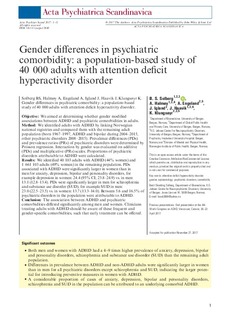Gender Differences in Psychiatric Comorbidity: Population-based study of 40,000 Adults with Attention-Deficit Hyperactivity Disorder
Solberg, Berit Skretting; Halmøy, Anne; Engeland, Anders; Igland, Jannicke; Haavik, Jan; Klungsøyr, Kari
Peer reviewed, Journal article
Published version
Permanent lenke
http://hdl.handle.net/11250/2488036Utgivelsesdato
2017Metadata
Vis full innførselSamlinger
- Artikler [5068]
- Publikasjoner fra CRIStin FHI [7550]
Sammendrag
OBJECTIVE: We aimed at determining whether gender modified associations between ADHD and psychiatric comorbidities in adults. METHOD: We identified adults with ADHD by linking Norwegian national registries and compared them with the remaining adult population (born 1967-1997, ADHD and bipolar during 2004-2015, other psychiatric disorders 2008-2015). Prevalence differences (PDs) and prevalence ratios (PRs) of psychiatric disorders were determined by Poisson regression. Interaction by gender was evaluated on additive (PDs) and multiplicative (PRs) scales. Proportions of psychiatric disorders attributable to ADHD were calculated. RESULTS: We identified 40 103 adults with ADHD (44% women) and 1 661 103 adults (49% women) in the remaining population. PDs associated with ADHD were significantly larger in women than in men for anxiety, depression, bipolar and personality disorders, for example depression in women: 24.4 (95% CI, 23.8-24.9) vs. in men: 13.1 (12.8-13.4). PDs were significantly larger in men for schizophrenia and substance use disorder (SUD), for example SUD in men: 23.0 (22.5-23.5) vs. in women: 13.7 (13.3-14.0). Between 5.6 and 16.5% of psychiatric disorders in the population were attributable to ADHD. CONCLUSION: The association between ADHD and psychiatric comorbidities differed significantly among men and women. Clinicians treating adults with ADHD should be aware of these frequent and gender-specific comorbidities, such that early treatment can be offered.
